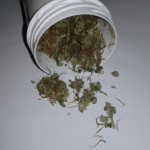
Germany is going to become one of the top medical cannabis countries in the world. The federal government approved a draft law in May, which is currently discussed by the parliament. The ruling parties in the Bundestag, the Christian Democratic Union (CDU) and the Social Democratic Party (SPD) are backing the proposal as well as the opposition parties The Left (DIE LINKE) and Alliance ’90/The Greens (GRÜNE). The ministry of health announced the law should become effective in 2017.
„Our goal is that seriously ill people are looked after to the best of our ability“ – Federal Health Minister Hermann Gröhe
This law will push Germany onto one level with the most progressive states like Canada, the Netherlands, Israel or some US states.
The new system: Cannabis on prescription and covered by health insurance
The new ruling regulates cannabis flos (marihuana) [(dried marijuana flowers)] and extracts like any other prescription drug. Thus every doctor will be qualified to prescribe it for any indication. Patients with a severe illness which „have no therapeutic alternative“ will get a reimbursement.
The fact that there is no positive list of diagnoses in combination the universal health insurance in Germany makes this new law significant.
Everybody can get a prescription and cannabis bought from a pharmacy with a prescription will be legal in Germany. Via international treaties at least citizens from other EU countries will be able to get cannabis from Germany and take it to their home country.
It is also planed to establish a governmental cannabis agency, which will give contract to companies to grow in Germany. This agency is demanded by the Single Convention on Narcotic Drugs. There are already cannabis agencies in the Netherlands, the USA and Canada.
Politics driven by courts, not justice
One thing has to be made clear in this context, the German Chancellor Angela Merkel didn’t become a cannabis fan. The government blocked the medical usage of cannabis in the past as much as they could. Nearly all of the progress made, is based on court rulings.
So, the new law is a reaction of the government to a sentence of the Federal Administrative Court. A patient filed a lawsuit to get a permission to grow for his own treatment and he won. The major reason in the judgment is that the patients cannot afford the cannabis from a pharmacies and only growing on his own can really provide cannabis to him for treatment. With the new law the government just tries to stop the growing by patients.
Germany – The status quo
Today beside already available drugs like dronabinol and the botanical drug substance naximibol (sativex) herbal medical cannabis in Germany is only available for patients with a s special individual permission from the Federal Institute for Drugs and Medical Devices. With this permission a patient can buy medical marijuana in pharmacies. The cannabis is imported from the Netherlands and is grown by company Bedrocan. Due to this it costs approx. 15 € per gram. This medicine isn‘t covered by health insurance unlike nearly all other medical expenses in Germany.
In June 2016 there were 779 patient with such a permission. Like I noted before, this way to get a treatment based on a lawsuit.
Usage of medical cannabis in Germany – Diagnoses
The Green Party in the Bundestag asked the government several questions about cannabis as a medicine. The answer included the diagnoses of the patients with a special permission. The majority suffers from chronic pain (62% n=483), with included spasticity from multiple sclerosis (approximately one of four pain patients). Patients with the diagnosis ADHD and depression are next biggest groups (12%, n=93 and 6% n=47). The government said 4,5% n=35 persons are suffering of Anorexia / Cachexia. It is known these got cancer, but you cannot get a cannabis permission for the treatment of cancer by now. Gastrointestinal diseases, Tourette syndrome, Epilepsy and other psychiatric diseases and disorders are represented with a 3,5-4% share each. The psychiatric diagnoses include Generalized anxiety disorder, Borderline personality disorder, Addiction, Posttraumatic stress disorder (PTSD) and Obsessive–compulsive disorder. 0,5% of the cases are suffering from neurological disorders or respiratory diseases.